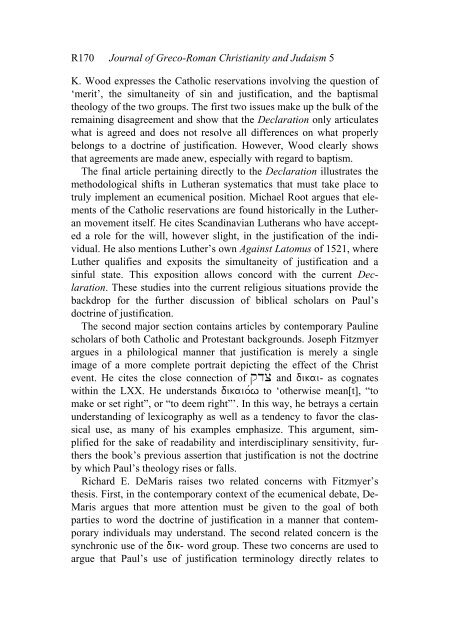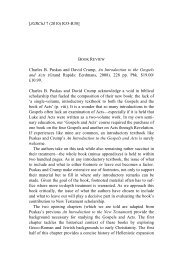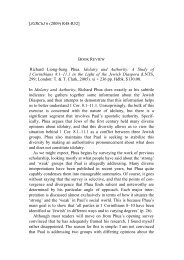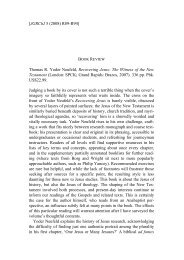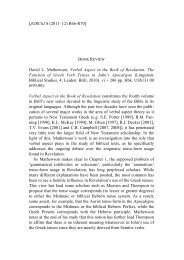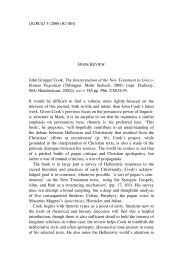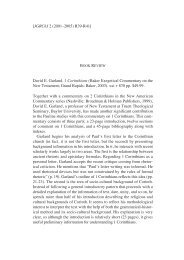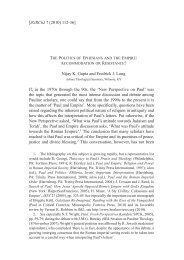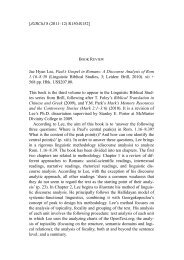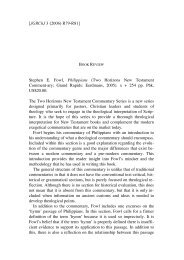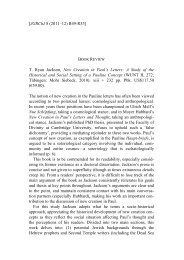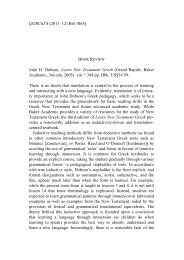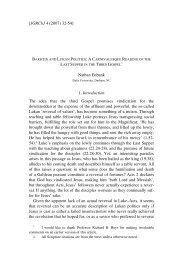David, E. Aune (ed.), Rereading Paul Together - Journal of Greco ...
David, E. Aune (ed.), Rereading Paul Together - Journal of Greco ...
David, E. Aune (ed.), Rereading Paul Together - Journal of Greco ...
You also want an ePaper? Increase the reach of your titles
YUMPU automatically turns print PDFs into web optimized ePapers that Google loves.
R170 <strong>Journal</strong> <strong>of</strong> <strong>Greco</strong>-Roman Christianity and Judaism 5<br />
K. Wood expresses the Catholic reservations involving the question <strong>of</strong><br />
‘merit’, the simultaneity <strong>of</strong> sin and justification, and the baptismal<br />
theology <strong>of</strong> the two groups. The first two issues make up the bulk <strong>of</strong> the<br />
remaining disagreement and show that the Declaration only articulates<br />
what is agre<strong>ed</strong> and does not resolve all differences on what properly<br />
belongs to a doctrine <strong>of</strong> justification. However, Wood clearly shows<br />
that agreements are made anew, especially with regard to baptism.<br />
The final article pertaining directly to the Declaration illustrates the<br />
methodological shifts in Lutheran systematics that must take place to<br />
truly implement an ecumenical position. Michael Root argues that elements<br />
<strong>of</strong> the Catholic reservations are found historically in the Lutheran<br />
movement itself. He cites Scandinavian Lutherans who have accept<strong>ed</strong><br />
a role for the will, however slight, in the justification <strong>of</strong> the individual.<br />
He also mentions Luther’s own Against Latomus <strong>of</strong> 1521, where<br />
Luther qualifies and exposits the simultaneity <strong>of</strong> justification and a<br />
sinful state. This exposition allows concord with the current Declaration.<br />
These studies into the current religious situations provide the<br />
backdrop for the further discussion <strong>of</strong> biblical scholars on <strong>Paul</strong>’s<br />
doctrine <strong>of</strong> justification.<br />
The second major section contains articles by contemporary <strong>Paul</strong>ine<br />
scholars <strong>of</strong> both Catholic and Protestant backgrounds. Joseph Fitzmyer<br />
argues in a philological manner that justification is merely a single<br />
image <strong>of</strong> a more complete portrait depicting the effect <strong>of</strong> the Christ<br />
event. He cites the close connection <strong>of</strong> qdc and dikai- as cognates<br />
within the LXX. He understands dikaio/w to ‘otherwise mean[t], “to<br />
make or set right”, or “to deem right”’. In this way, he betrays a certain<br />
understanding <strong>of</strong> lexicography as well as a tendency to favor the classical<br />
use, as many <strong>of</strong> his examples emphasize. This argument, simplifi<strong>ed</strong><br />
for the sake <strong>of</strong> readability and interdisciplinary sensitivity, furthers<br />
the book’s previous assertion that justification is not the doctrine<br />
by which <strong>Paul</strong>’s theology rises or falls.<br />
Richard E. DeMaris raises two relat<strong>ed</strong> concerns with Fitzmyer’s<br />
thesis. First, in the contemporary context <strong>of</strong> the ecumenical debate, De-<br />
Maris argues that more attention must be given to the goal <strong>of</strong> both<br />
parties to word the doctrine <strong>of</strong> justification in a manner that contemporary<br />
individuals may understand. The second relat<strong>ed</strong> concern is the<br />
synchronic use <strong>of</strong> the dik- word group. These two concerns are us<strong>ed</strong> to<br />
argue that <strong>Paul</strong>’s use <strong>of</strong> justification terminology directly relates to


